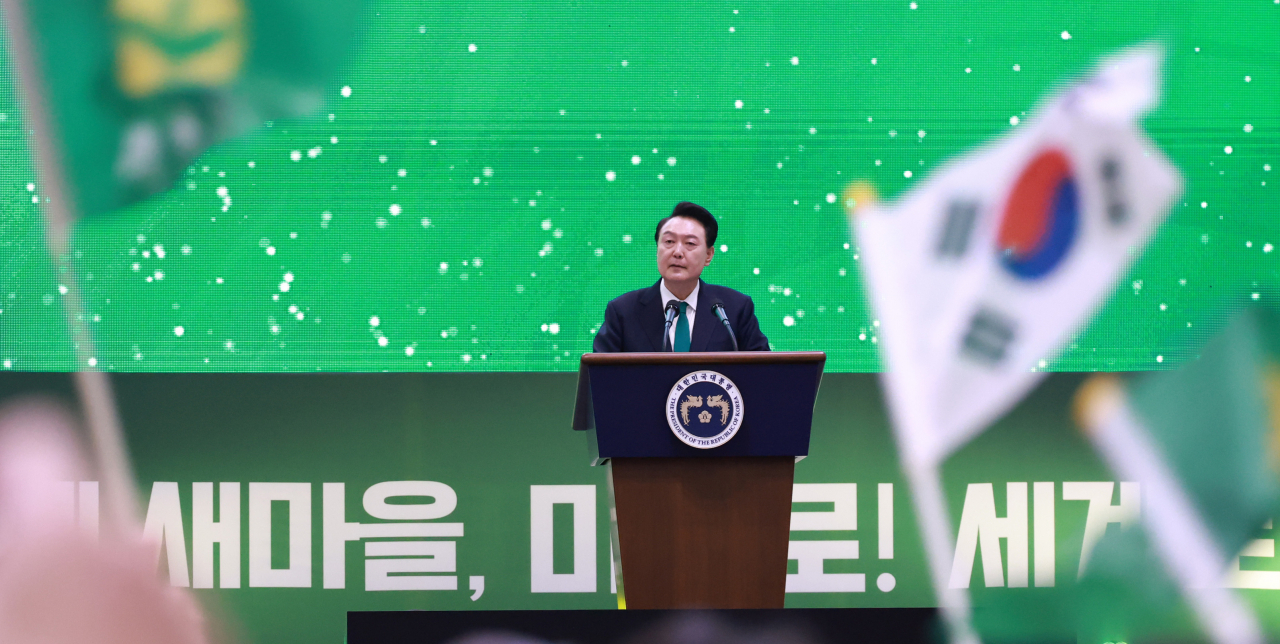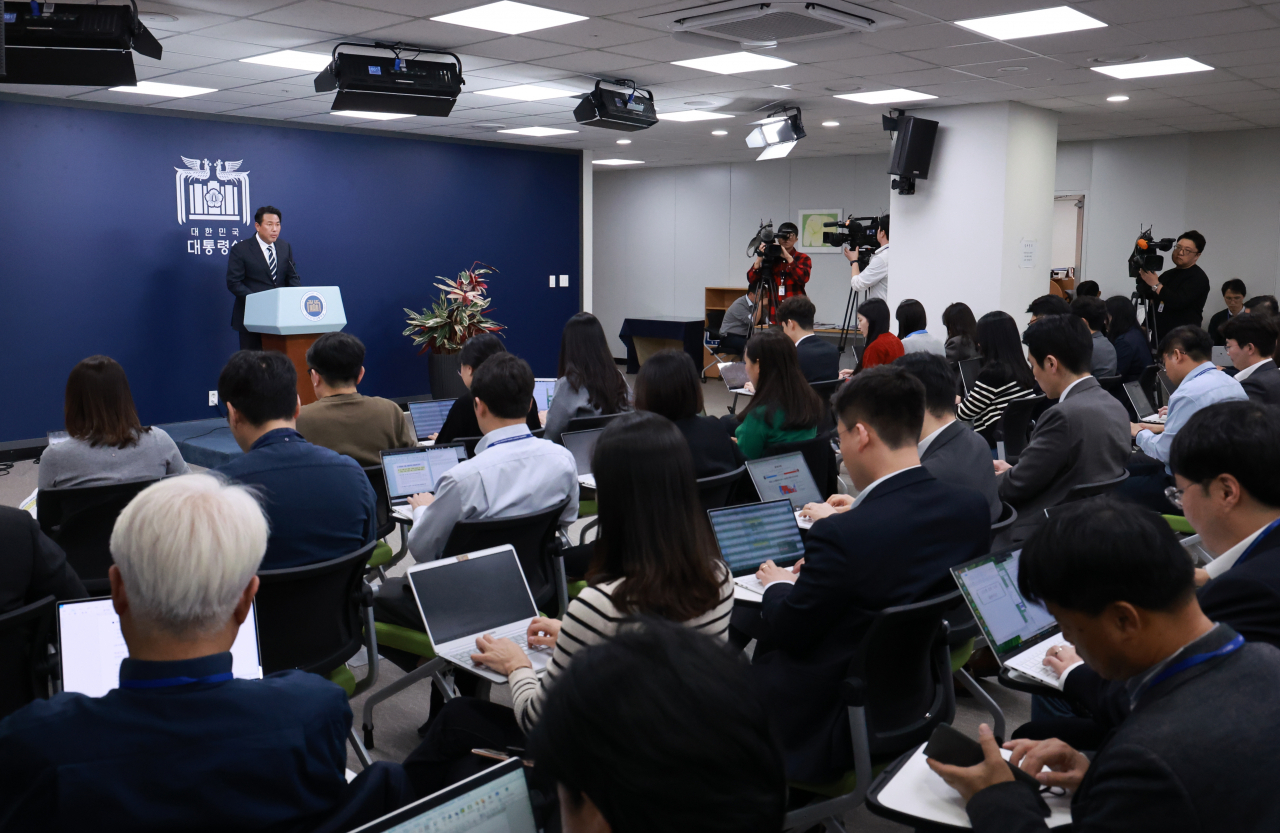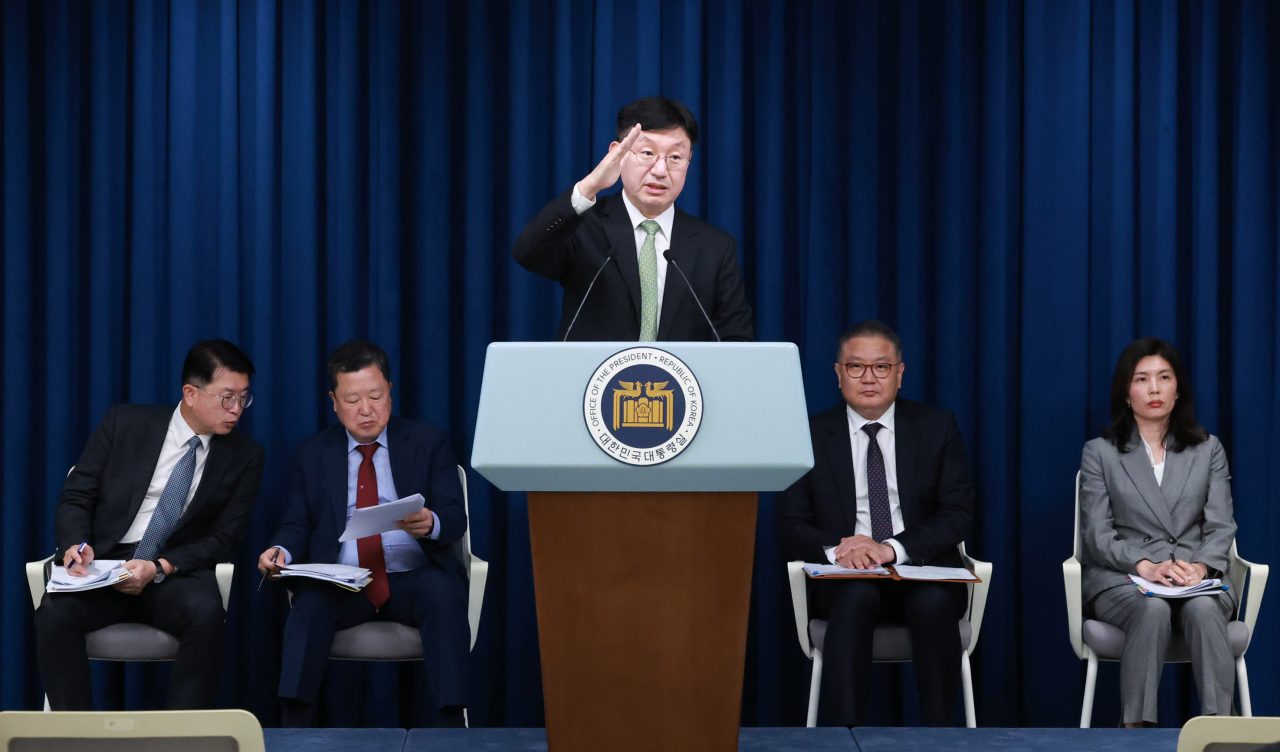 |
President Yoon Suk Yeol attends the 2024 National Saemaeul Leaders' Conference at Kintex in Goyang, Gyeonggi Province Tuesday. (Yonhap) |
President Yoon Suk Yeol is one of South Korea's first heads of state who is struggling to reverse a downward trend in his approval rating before his five-year term has even reached the halfway point.
Yoon's approval ratings fell to its lowest ever point last week, as controversies surrounding him and his wife grew.
Calls for first lady Kim Keon Hee to apologize over various scandals continued in the National Assembly despite the prosecution's recent decision not to charge her for antigraft law violations or her alleged involvement in a stock manipulation scheme in the early 2010s.
The opposition party has also accused Yoon and his office of interfering in the Marine Corps' internal probe into the death of a conscript during a rescue operation in July 2023.
Both Yoon and Kim are now mired in election meddling allegations, as the opposition party has accused them of interfering in the ruling party's candidate nomination processes for elections in June 2022 and April this year.
Coupled with Yoon’s adversarial relationship with the opposition-led parliament, as well as his vetoes of opposition-backed bills, these conflicts have largely overshadowed his achievements over the past 2 1/2 years.
While Yoon's approval rating hit the rock-bottom of 19 percent as of the end of October, according to a poll by Gallup Korea on Friday, the Yoon administration has brought changes in some challenging policy areas.
Here are five goals that Yoon has been focused on making progress on.
Tackling demographic challenges
Political strife has hampered the Yoon administration's launch of a new ministry dedicated to population planning, which was proposed in July.
The Yoon administration has sought to tackle South Korea's demographic problems, with the country facing challenges on two fronts -- an increase in the elderly population and a decline in childbirths.
South Korea recorded the world's lowest fertility rate at 0.72 as of 2023 and is anticipated to have more than 20 percent of its population at the age of 65 or older in 2025, becoming a super-aged society.
Beginning next year, those on parental leave for 12 months can be paid up to 23.1 million won ($16,750), up nearly 30 percent from the current level, as the limit on the amount of salary compensation is to be raised. More companies than before will be eligible for subsidies for allowing shorter, flexible work hours for pregnant employees and hiring people to cover for staff on maternity leave.
Also, companies will be required to provide 10 days of additional paid leave for women who have suffered a miscarriage or stillbirth, as well as their spouses. Currently, companies are only required to give women paid leave in such an event, and only five days of it. Financial support for infertility treatment was expanded earlier in November.
These were some of the 141 objectives achieved as of end-October, out of 151 policy goals set in June to tackle Korea's low birth rate.
On a separate note, the state-sponsored after-school programs dubbed Neulbom have taken root since their launch early this year. All 6,185 elementary schools nationwide employed such programs in the second half for some 280,000 first graders. Stressing the nation’s responsibility to shoulder the burden of child care, the presidential office said it wants to make parents’ careers more sustainable. The Yoon administration also unveiled a plan to integrate nursery schools with kindergartens by 2026.
South Korea has recently seen some signs of a possible recovery from extremely low birth rates. August recorded an on-year rise in childbirths by 5.9 percent, with 20,098 births, along with July's 7.9 percent increase, with 20,601. The number of marriages in August also climbed 20 percent from the previous year to 17,527.
"It is imperative not to miss a golden opportunity for a turnaround from low fertility through concerted efforts of the government and the parliament," Sung Tae-yoon, director of national policy, told reporters Tuesday. "We will go all out to achieve a birth rate of 1.0 by 2030."
Yoon’s office also said it was the first administration to have created more than 1 million jobs for those over age 65, which amounts to about 10 percent of the nation’s senior population.
 |
Principal Deputy National Security Adviser Kim Tae-hyo is seen holding a press briefing at President Yoon Suk Yeol's office in Seoul on Wednesday. (Yonhap) |
'Global pivotal state'
Under his "global pivotal state" mantra, Yoon paved the way for elevating South Korea's security alliance with the United States to what he says is a "nuclear-based" one, restoration of shuttle diplomacy with Japan, as well as three-way talks among Seoul, Tokyo and Beijing, while countering North Korea.
Following the US, Yoon's Indo-Pacific Strategy helped South Korea continue regional efforts to promote peace and prosperity, while the country’s closer cooperation with the North Atlantic Treaty Organization drew keen attention, with Yoon attending the NATO summit three consecutive years in a row including this year.
"South Korea will tighten cooperation with Europe and NATO so that our contribution to Euro-Atlantic security could lead to international support (for security) on the Korean Peninsula and the Indo-Pacific region," said Kim Tae-hyo, principal deputy national security adviser for President Yoon on Wednesday.
Yoon expanded his diplomatic horizons not only to the Indo-Pacific region but also to Africa and the Pacific Islands. South Korea also cemented its relationship with Central Asia by launching the K-Silk Road Initiative, and with Southeast Asia by elevating ties to a Comprehensive Strategic Partnership, the highest level in ASEAN's diplomatic hierarchy this year.
Yoon’s efforts to put himself at the forefront of South Korea's diplomacy -- holding some 210 bilateral meetings with foreign leaders during the first half of his five-year term -- have brought South Korea a total of $971 billion in deals through investments, orders and nonbinding agreements, according to the presidential office.
Among them is a potential 24 trillion won deal to build two nuclear power reactors in the Czech Republic, as the Central European country aims to reduce its reliance on Russia for energy. South Korean firms also secured a combined 3.3 trillion won in nuclear exports to Egypt and Romania.
Yoon’s visit to the Middle East also landed $79.2 billion of investments and orders from Saudi Arabia, the United Arab Emirates and Qatar combined. South Korea also achieved $30.8 billion in arms exports from 2022 to 2023, according to the presidential office, as a 44.2 billion won contract with Poland signed in 2022 was proceeding as planned.
Improving macroeconomic strength
South Korea has managed to curb inflation, reduce unemployment and restore its trade balance during Yoon's time in office.
As of August, South Korea's inflation came to 2 percent, lower than the average of the member countries of the Organization for Economic Cooperation and Development, at 4.7 percent.
Meanwhile, the nation's employment rate came to an all-time high of 62.6 percent in 2023. The unemployment rate for all types of jobs also stood at 2.7 percent in 2023, the lowest level in history. Yoon's office cited newly-created private-sector jobs as the reason for this.
Exports have increased on-month for 13 consecutive months since October 2023. South Korea has logged a trade surplus for 17 months straight since June 2023. Foreign direct investment in South Korea has been on the rise, as the figure hit a high point of $32.7 billion in 2023. This year's $25.2 billion from January to September is the highest for a stretch of three consecutive quarters.
For the first time in South Korea's history, the annual gross national income of the country per capita in dollars surpassed that of Japan, aided by the Bank of Korea's revision of the national accounts base year and Japan's weak yen.
Moreover, South Korea is expected to attract a fresh 75 trillion won in bond investments following the country's inclusion in the FTSE World Government Bond Index in October.
Asked why many do not agree that there has been an economic recovery during Yoon’s tenure, an official of the presidential office on Tuesday attributed the phenomenon to price hikes on specific goods -- the cost of food has risen overall and occasionally spiked -- and the higher cost of dining out due to high labor costs.
Another official said on condition of anonymity that the Bank of Korea’s decision to cut policy rates in line with developed economies’ monetary policymakers “could be helpful” to relieve financial burdens on small businesses. The South Korean central bank carried out its first rate cut in October by 0.25 percentage points for the first time in over three years.
 |
Senior Presidential Secretary for Civil Affairs Jang Sang-yoon (from left), Senior Presidential Secretary for Economic Affairs Park Chun-sup, President Yoon Suk Yeol's policy aide Sung Tae-yoon, Senior Presidential Secretary for Science and Technology Park Sang-ook and Senior Presidential Secretary for Population Policy You Hye-mi attend a press briefing to discuss Yoon's policy achievements on Tuesday. (Yonhap) |
Cooling down housing market
According to the presidential office, stopping what it calls "punitive" taxation -- such as exemptions to the capital gains tax in addition to other taxes such as the comprehensive real estate holding tax -- as well as deregulation measures, have contributed to the normalization of the real estate market.
Yoon's policy aide Sung Tae-yoon said that the Yoon administration's "market-friendly policy" of implementing deregulation concerning apartment reconstruction projects and easing taxation on multiple homeowners could potentially normalize the housing market by promoting supply in regions with high demand.
Sung added the government was working to abolish measures introduced by former President Moon Jae-in to stabilize housing prices through a new bill introduced in September. The measures were followed by a sharp increase in house prices, with many accusing them of having backfired.
In the meantime, Seoul's average housing purchase price fell by 8.3 percent from April 2022 to September 2024, according to the government.
An official of the presidential office said that it prioritized the housing supply over deliberate policy interventions to control housing prices, adding that the Yoon administration's role is to secure ample land for housing construction and promote teh reconstruction of old apartment complexes.
Addressing the most vulnerable
Yoon’s office and his government consistently sought to identify the most vulnerable in society and provide them with sustainable welfare.
The government has initiated a nationwide one-on-one caregiving system for people suffering from severe developmental disorders this year.
For divorced couples, in the event that the other parent is delinquent on child care support payments, single-parent families are now eligible for monthly childrearing allowances from the government in advance. Alongside this, the government established a system to reclaim unpaid child support from delinquent payers.
Mandatory birth notification and anonymous birth registration systems are also in place since July, in order to prevent abuse of unregistered children.
Other central and local government-sponsored projects for counseling services for those suffering from mental health issues, prevention of "lonely deaths" and supporting isolated people have also been implemented earlier this year.
These were buttressed by the gradual increase in the budget related to social welfare since Yoon’s inauguration in 2022, according to Yoon’s office. It estimated that this year’s budget dedicated to social welfare came to 104.9 trillion won, up over 30 percent from 2022.







![[Today’s K-pop] Blackpink’s Jennie, Lisa invited to Coachella as solo acts](http://res.heraldm.com/phpwas/restmb_idxmake.php?idx=644&simg=/content/image/2024/11/21/20241121050099_0.jpg)